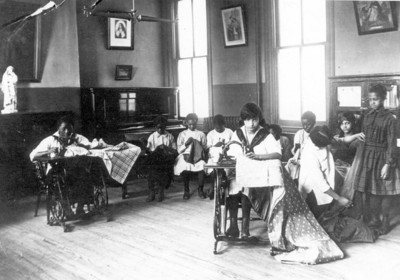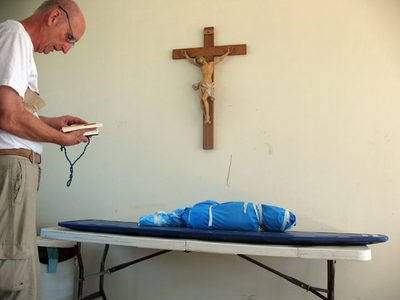
From Baltimore comes this wonderful story about an orphan who never forgot where she came from — and 90 years later, is giving something back:
Cora Barnes has a deep respect for the upbringing she received at the Baltimore orphanage she knew throughout her youth. She learned her algebra and Roman Catholic Latin hymns. She sang at midnight Masses and said her prayers. She also never forgot the love and friendships formed at the little-known institution.
And now, nearly eight decades after she arrived at the orphanage, she returns weekly to its brick buildings set between Maryland Avenue and Howard Street. For the past 17 years, she has been a volunteer at what is now the Franciscan Center, where she sorts women’s clothes and works actively with the poor and homeless. The center recently helped her celebrate her 90th birthday.
She also retains a strong affection for the school and home that helped her navigate what could have been a difficult period.
There were only four young women in Barnes’ 1942 graduating class. She and 60 girls in the school were orphans or children in the care of the Franciscan Sisters, an order of women who housed, fed and educated the African-American children left at their doorsteps or brought to the sisters to be raised.
The religious order has since changed its mission. The sisters no longer take in orphans. They have converted their former convents into housing for low-income residents and homeless women. They run the social service center where Barnes returns to help with scores of other volunteers who give a day or two a week in a highly personalized setting that does its best to overcome notions of cold charity.
For example, one day last week, a busload of Calvert Hall College High School students stacked canned goods and served hot meals to the 200 men and women who made their way down Ware Street, the alley that runs behind Maryland Avenue. Other Baltimore charities, including the Helping Up Mission, give clothes there. Upstairs, social workers help clients who face eviction and utility cutoff.
On the Tuesdays when Barnes returns to 23rd Street, she works only a wall or two away from the combined convent-orphanage kitchen where she learned basic housekeeping skills 80 years ago.
“It was really a very happy time in my life,” said Barnes, who lives in nearby Waverly. “We got up early for Mass, had breakfast, did our chores and went to school.”
In racially segregated Baltimore, there were black Roman Catholic parishes, schools and orphanages. Barnes and her sisters, Mary and Elizabeth, were all sent to the care of the Franciscan Sisters, a London-founded order whose members worked with the poor. Recruited to work in Baltimore, they chose to run an orphanage for children who were shunned by the city’s other Roman Catholic religious communities.
“I got a good upbringing from the sisters,” Barnes said. “I think we need some orphanages right now; there are kids out there who need a good upbringing.”
Continue reading for more.

